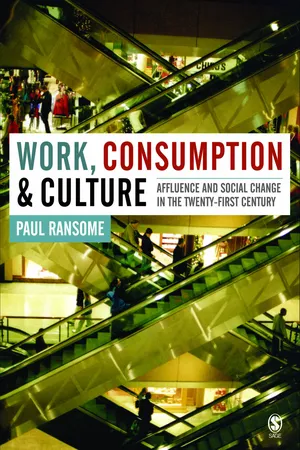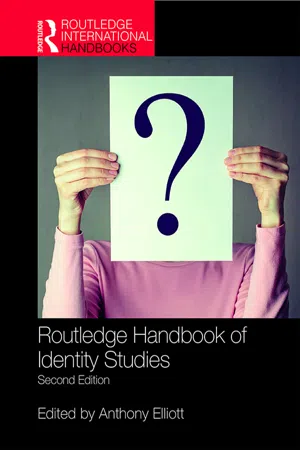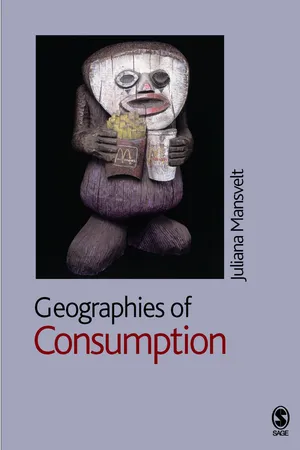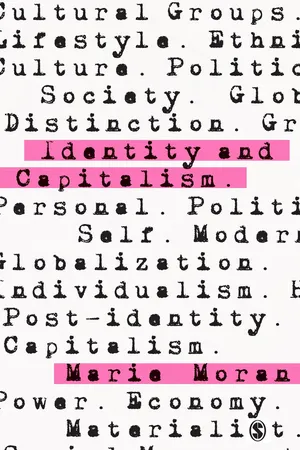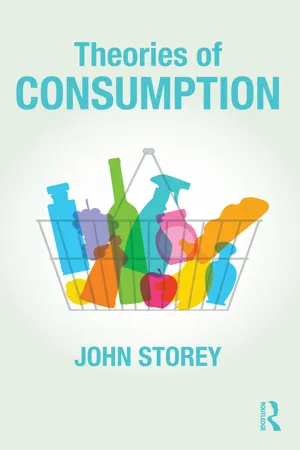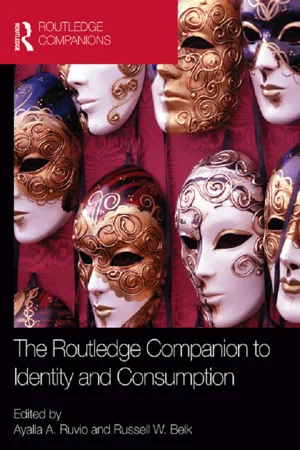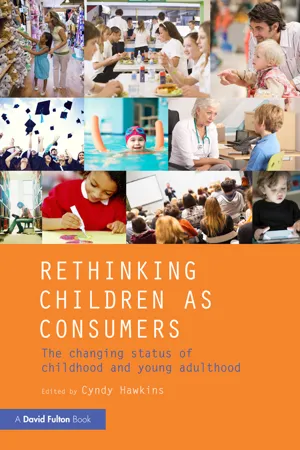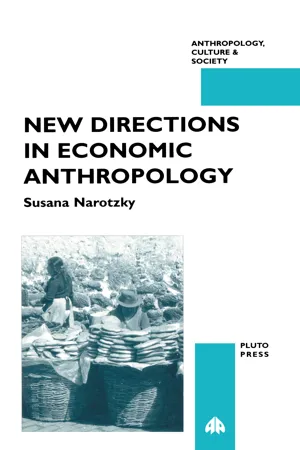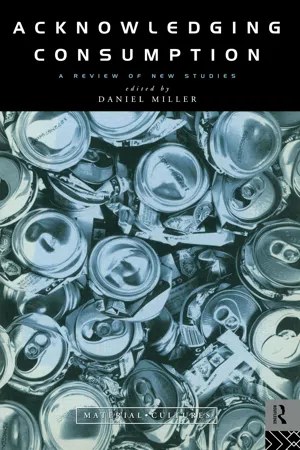Social Sciences
Consumption Identity
Consumption identity refers to the way individuals express their sense of self and belonging through their consumption choices. It encompasses the products, brands, and experiences people choose to associate with, which can reflect their values, aspirations, and social status. This concept is often studied in the context of consumer behavior and cultural studies to understand the role of consumption in shaping personal and social identities.
Written by Perlego with AI-assistance
Related key terms
10 Key excerpts on "Consumption Identity"
- eBook - ePub
Work, Consumption and Culture
Affluence and Social Change in the Twenty-first Century
- Paul Ransome(Author)
- 2005(Publication Date)
- SAGE Publications Ltd(Publisher)
One of the key differences then, between work-based and consumption-based society is that in the former people somehow experience themselves as the product of processes and structures which were in place before they arrived, and over which they have relatively little control. Their expectations for the future moreover, are also very much determined by their origins. In consumption-based society on the other hand, people experience themselves much more as the instigators of their own actions. This is certainly what one would expect to find given that the activities of production are largely prescribed whilst those of consumption are much more open to choice and self-selection. Autonomy, choice and independence are, for the majority, characteristics of consumption not of work.As sociologists, and in contrast to the relatively closed concept of social identity associated with class membership in work-based society, a concept which presupposes that economically, culturally and emotionally one is forever bound by one’s class and occupation, the concept of social identity in consumption-based society is one which suggests that the formation of the self is a reflexive process as people constantly monitor their past actions and modify their future behaviour in light of ongoing experiences. In consumption-based society the range and depth of these experiences is greater than it was in work-based society and thus the process of reflection and modification is freer and more dynamic. As Craib has expressed it: ‘the central feature of the self in modern society is its reflexivity, a constant questioning and reconstruction of the self in a lifetime project. We are constantly constructing and revising our personal stories and so reconstructing ourselves (Craib, 1998: 2).12Consumption as a basis for social activity
In what ways then, does participation in the realm of consumption enable people to express the social aspects of identity? The first set of reasons are all to do with the central fact that like work, consumption is a profoundly social activity which relies upon some kind of cooperation with others. Although the content of the activities involved are obviously different, consumption is as much a socially embedded process as is participation in the world of work. It also provides excellent opportunities for satisfying our need for social contact. Most obvious are acts of consumption which involve groups of people consuming collectively at some form of public venue. Being a spectator at a sports event or part of the audience at some kind of artistic performance are clear illustrations of this. The element of participation is itself an important part of this kind of consumption (the experience of watching a film at a cinema is quite different from watching the same film on television at home). - eBook - ePub
Routledge Handbook of Identity Studies
2nd edition
- Anthony Elliott(Author)
- 2019(Publication Date)
- Routledge(Publisher)
14Consumer identities
Roberta SassatelliIntroduction
Consumption is best considered as a complex economic, social and cultural set of practices, interconnected with all of the most important phenomena which have come to make up contemporary Western society: the spread of the market economy, a developing globalisation, the creation and recreation of national traditions, a succession of technological and media innovations, etc. If it is true that in today’s ‘consumer society’ we are born to consume, it is also true that consumption has cultural and practical implications that go way beyond satisfying our daily needs through commodities, or even symbolically play with them in variously elaborated manners. To consume is also to act as ‘consumers’, that is, to put on a particular kind of identity and to deal with its contradictions. In this light, consumer culture is more than commoditisation and affluence, more than conspicuous consumption and the democratisation of luxuries. Consumer culture is deeply implicated in the fabrication of identities: it produces consumers, and does so in a variety of ways. For a growing variety of activities growing numbers of people now speak of themselves as consumers, and they are being addressed as consumers by a host of institutions, within and without the market. The centrality of the ‘consumer’, the lengthy and contested historical processes which led to its formation, the many theoretical portrayals of consumer agency which have followed each other in a succession of criticism and cross-reference, the political implications of conceiving contemporary culture as made of consumers are addressed in this chapter. Placing emphasis on the social, cultural and institutional processes which have made consumption into a contested field of social action and public debate, I shall consider how consumer identities have been constructed and promoted as major social identities in contemporary societies. - eBook - ePub
- Juliana Mansvelt(Author)
- 2005(Publication Date)
- SAGE Publications Ltd(Publisher)
A view of individuals as consumers who are engaged in the construction of self by purchasing commodities which will provide distinction results in a somewhat superficial and one-sided view of consuming subjects (Falk and Campbell, 1997). People are reduced to shoppers, consumers and performers of ‘social identities’, neglecting the spatiality and relatedness of experiential bodily practices and processes of cognitive self-reflexivity. Yet this ‘relatedness’ may be critical in choices not to buy or to consume, for example, decisions about whether a commodity is for me, imagining whether one is or could be ‘like that?’ (Falk and Campbell, 1997).The tendency to reduce individuals to lifestyle shoppers, actively choosing commodities and identities, is challenged by geographical research with shoppers (Jackson, 1999). Shopping is often routine and mundane work and identity is frequently articulated in relational rather than positional terms (such as through notions of the family, or racialized understanding of place). Practices of consumption may also intersect with and partly acquire their meanings from other spheres of social life, other practices, practical knowledges, popular experiences and lifestyles (Mort, 1988).We consume according to who we are?
Rather than practices which emerge from what subjects consciously or unconsciously ‘desire to become’, a second predominant sense in which consumption has been used is that it occurs because of who we are. Here consumption becomes the articulation of one’s sense of positionality as ‘more and more people define themselves according to their style of living’ (Gottdiener, 2000: 3). Thus the consumption of goods constitutes one’s expression of taste, income, employment, gender, position and so forth.Empirical research has indicated that class, gender, cultural, generational and family identities influence the construction of personal identities (Lunt and Livingstone, 1992). Saunders (1989) concluded that social structures influenced consumption, arguing from his study of housing classes and consumption cleavages that consumption had actually replaced production as the major source of class differentiation in contemporary society. Similarly Crompton (1996) argues class continues to shape life chances and attitudes in contemporary society. - eBook - ePub
- Marie Moran(Author)
- 2014(Publication Date)
- SAGE Publications Ltd(Publisher)
This was noted rather than explored in any great depth in the last chapter. Many theorists have explored the links between identity and consumption; indeed, it is routine to find these concepts treated together in contemporary cultural studies (Featherstone, 1990; Miller, 1995; Slater, 1997; Sassatelli, 2007; Ruvio and Belk, 2013). While some argue that consumption is now an important site of identity formation, such that one’s personal style and possessions rather than one’s social role or job, creates one’s sense of identity (Giddens, 1990; Beck, 1992; Bauman, 2005, 2007; Sassatelli, 2007), others, particularly those writing from a Marxist perspective, argue that the very processes of identity formation themselves encourage and sustain practices of consumption (Giroux, 1994; Slater, 1997; Hennessy, 2000; Fine, 2006). While it is certainly true that consumption plays a role in helping people define what they see as their identities today, and also that particular ‘social identities’ and ‘personal identity types’ are deliberately targeted and commodified, generating new and lucrative markets for identity-based consumption, neither approach offers a fully adequate account of the connections between ‘identity’ formation and consumption. Crucially, both miss the key point that identity, as we now know it, is a recent idea in western culture and politics. Thus where these theorists make the case that identity formation used to occur through one’s social role, family position, employment or political affiliation, but now occurs through practice of consumption, they assume the category of identity to pre-exist the processes of identity formation via consumption that they now describe and analyse - eBook - ePub
- John Storey(Author)
- 2017(Publication Date)
- Routledge(Publisher)
7Consumption and IdentitiesIn this chapter I discuss ways of thinking about the relationship between consumption and identity. This will include a critical assessment of Judith Butler’s theory of performativity, and accounts of both ‘displaced meaning’ and the historical role played by the department store in the process of learning to make identities in social practices of consumption. What these accounts have in common is that they all see consumption as fundamental to the production of identity.We are what we consume
When we meet someone for the first time, in order to get to know the kind of person they are, we ask certain questions. An obvious question is what kind of work they do. But sooner or later, in order to get to know them better, we will ask questions about matters of consumption. What books do they read? What films do they like? Do they have favourite television programmes? To what kinds of music do they listen? Which football team do they support? These, and many more like them, are all questions that connect consumption with questions of identity. On knowing the answer to enough of these questions, we feel able to construct a cultural and social pattern and thus to begin to locate the person in a particular cultural and social space – we begin, in other words, to think we know who they are.Traditionally, identity has usually been understood as something coherent and fixed; an essential quality of a person that is guaranteed by nature, especially human biology (‘human nature’). This traditional view is sometimes modified to produce a second view of identity in which it is still something fixed and determined, but in this formulation biology is said to combine with social variables such as class, ‘race’, ethnicity, or gender, to produce and guarantee (what is still) a coherent and fixed identity. Over the course of the nineteenth century and the early part of the twentieth a number of major intellectual assaults were made on this way of seeing identity, each in its different way making a successful challenge to the idea of a fixed and coherent self. In different ways, Charles Darwin’s theory of evolution (the evolving self ), Karl Marx’s concept of history (the historical self ), Sigmund Freud’s theory of psychoanalysis (the unconscious self ) and Ferdinand de Saussure’s theory of language (the self-enabled and constrained in and through language) all helped to ‘decentre’ the traditional self. - Ayalla A. Ruvio, Russell W. Belk(Authors)
- 2013(Publication Date)
- Routledge(Publisher)
Exploring and Conceptualising the Interrelationships Between Self and Possessions Through Hong Kong Chinese Consumers’ Narratives . PhD, Lancaster University.- Wong, P., Hogg, M.K. and Vanharanta, M. (forthcoming) “Consumption Narratives of Extended Possessions and the Extended Self.” Journal of Marketing Management .
- Yang, K.S. (1995) “Chinese Social Orientation: An Integrative Analysis.” In T.Y. Lin, W.S. Tseng and E.K. Yeh (eds), Chinese Societies and Mental Health . Hong Kong: Oxford University Press.
Passage contains an image
I.IV Stigma, sacrifice, and self
DOI: 10.4324/9780203105337-15Passage contains an image
11 STIGMA, IDENTITY, AND CONSUMPTION
Özlem Sandıkcı and Güliz Ger DOI: 10.4324/9780203105337-16Despite all the 21st-century rhetoric of diversity, most people expect and desire some normalcy – however that is defined by their milieu. If a person is to deviate from what is considered to be “normal” at a particular point in time and place, s/he is likely to face some consequences. Then, if consumption is fundamentally linked to identity, how identities are received and assessed by others will have wide-reaching implications for the ways individuals consume. Identity is not simply a personal thing; it is valorized differentially by various collectivities and refracts back to the practices of the individual. An individual will consume in a manner that will serve to shift the experienced socio-cultural valorization, to make it more positive, accepted, appropriate, or normal, at least among a particular collectivity, or consume in a manner to protest the particular valorization, or both. As consumption serves to objectify relationships (Miller 1987- eBook - ePub
Rethinking Children as Consumers
The changing status of childhood and young adulthood
- Cyndy Hawkins(Author)
- 2016(Publication Date)
- Routledge(Publisher)
Chapter 7 Consumption, identity and young people Mark WeinsteinIntroduction: consumer society
To borrow from one of the greatest opening lines in English literature, it is a truth universally acknowledged that we now live in a consumer society (Austen, 1992). However, that is where the universality ends and the contention begins. Questions concerning the precise shape of this consumer society, its impact on our lives, our identities and relationships, our power and place in society are as fiercely debated today as they have been at any time since the explosion of modern consumer society in the postwar period (Osgerby, 1997). While the development of consumer society is commonly traced back to the industrial revolution of the late nineteenth century, modern consumerism is more commonly seen as a feature of the post-industrial society of the late twentieth century (Sassatelli, 2007). Moreover, interconnected processes at the heart of globalisation now mean that we live in an age where powerful transnational cultural corporations seek to shape consumption for a global market (Nederveen Pieterse, 2004).Central to debates around consumer society are questions concerning the extent to which our identity, our own subjective interpretation of how we see ourselves within society, now derives primarily from our consumption practices. As the economies of the advanced industrial capitalist world have moved away from their industrial base and have become increasingly founded on retail, services and consumption (Lash and Urry, 1987), it is now argued that where once people would derive identity through their role as workers, as members of a social class, a religion or through an ethnicity or community, they now define themselves through consumption-based identities. What we eat and wear, the cars that we drive, the music that we listen to and the holidays that we take allegedly now communicate more about ourselves than the structural collectivist traditions of the past (Paterson, 2006). - eBook - ePub
- Susana Narotzky(Author)
- 1997(Publication Date)
- Pluto Press(Publisher)
Within the semiological perspective, some attempts at understanding the sign-exchange value across cultures and societies, within a world market economy, have proved more interesting than Baudrillard’s theoretical discourse. Spooner (1986) in a study of the ‘authenticity’ value of oriental carpets in European culture, shows how the production of its distinguishing sign value cannot be abstracted from history. Spooner considers together, first, the production relations and cultural meanings objectified in the carpet; second, the process of commercialisation and the production of a transactional meaning between local and foreign merchants; and, finally, the European consumption process producing a sign of ‘authenticity’ that signifies distinction. Moreover, all these processes are interlocked and are constantly being transformed by their interaction and their relation to wider economic and political contexts (for example the Soviet state’s control of Turkmenistan). This, I think, is a much richer analysis of the production of meaning in consumption processes.The idea that consumption is related to the process of producing distinction, not only as a function of differential allocation of material resources but also of symbolic resources, has been expressed in the work of anthropologists such as Bourdieu (1988 [1979]), Appadurai (1986) and Miller (1987, 1995). Consumption in this view is strongly related to identity construction. Appadurai, for example, is concerned with the changing cultural contexts of commodities circulating among a worldwide range of societies. The case study by Spooner, above, seems to me one of the best illustrations of this perspective.For Miller, the process of consumption is treated in a very philosophical way. It is presented as part of a process of ‘objectification’, that is, the creative construction of humanity through the double process of ‘externalisation’ and ‘reappropriation’ of ‘particular form’. Form did not exist prior to the initial creative act and is not eliminated by the latter re-incorporation act (Miller 1987:28). Miller sees consumption, in the context of global present-day capitalism, as the only remaining domain that enables people to forge a meaningful relationship with the world. Consumption, then, appears as a mutually constitutive process of culture and identity creation (Miller 1995:17, 31, 34). Increasingly, consumption becomes the only arena of political agency.Miller’s views are provocative and they appear to present several advantages over previous ‘antiquated’ (!) ‘production’ theories. The first advantage is the ‘progressive’ potential of consumption: that is, when consumption practices may become the key to the transformation of processes of production and distribution. The second advantage is that ‘an emphasis upon consumption is an acknowledgement of the potential and creative power of diverse human groups to make of their resources what they will’ (Miller 1995:41), referring to the ‘relatively autonomous and plural process of cultural self-construction’ and ‘based on respect of consumption as empowerment’ (1995:41). And last, but not least, consumption allows for a ‘morality of egalitarianism’ based on the empowerment attained through the self-construction of people as consumers: - eBook - ePub
- Daniel Miller(Author)
- 2005(Publication Date)
- Routledge(Publisher)
Not that defining consumption is in any case an easy matter since it is hard to overcome its accepted popular and professional usage to refer to an exclusively economic activity. Yet the assumptions contained in such usage, especially the idea that these activities can be identified by the analyst without reference to the subjects understanding of ‘what he or she is doing’, together with the presumption that ‘consumption’ and ‘production’ are necessarily exclusive categories, are ones that many sociologists might want to query On the other hand, some sociologists, in their understandable frustration with economic usage, have fallen into the trap of substituting functionalist definitions for the traditional ones, applying the term ‘consumption’ to that activity which serves to enhance an individual’s status or confirm or construct their identity. This practice is equally unhelpful, obscuring as it does the difference between activities that aim to achieve these goals and those that do in fact realise them, as well as that between ‘consumption’ proper and its functional alternatives. Perhaps, therefore, for the time being at least, it would be sensible to employ a simple working definition, one that identifies consumption as involving the selection, purchase, use, maintenance, repair and disposal of any product or service. 3 Now it is important to note that while purchase may be direct and personal, effected through the marketplace, it may also be indirect and impersonal, such as that effected through taxation; whilst it is also important to recognise that this definition embraces services as well as goods. Both these dimensions are sometimes overlooked in those treatments of consumption that adopt a primarily Marxist ‘commodities’ approach (see Lee 1993) - eBook - ePub
Communicating Successfully in Groups
A Practical Guide for the Workplace
- Richard Hammersley, Marie Reid(Authors)
- 2014(Publication Date)
- Routledge(Publisher)
6 The social construction of identityObjectives
By the end of this chapter you should understand the six basic ideas about identity that are listed below.Basic ideas about identity
We will draw upon both psychology and sociology and offer you six basic ideas:- Identity is fluid, dynamic and negotiable.
- Identity is communicative. We signify our social identities to other people, interpret feedback from them about what we are like and may modify our identities on the basis of that feedback.
- Our stable personal identities are constructed to make sense of what has happened to us and how we have related to other people.
- People’s identity constructs are usually socially functional for them, and this can apply even to deviant, damaged or spoiled identities.
- Identity involves identification with specific groups of people, but also contribution to the nature of those groups; this is a fundamental aspect of social activity.
- People routinely adopt different identities in different social groups; hence the idea of a social role.
The last two points will be covered in detail in other chapters. It follows from these key points that although you are often defined by your interactions with others, you can also change yourself and how others see you. Furthermore, this is easier to accomplish if you have good communication skills and awareness of how social processes work. To a certain extent it is possible to adjust your identity by managing how others perceive and judge you, although this does not mean that you should be manipulative about it. Indeed, people tend to disapprove of others who are overly concerned to present whatever identity seems the most socially convenient at the time.Identity is fluid, dynamic and negotiable
As we will see in Chapter 10
Learn about this page
Index pages curate the most relevant extracts from our library of academic textbooks. They’ve been created using an in-house natural language model (NLM), each adding context and meaning to key research topics.
